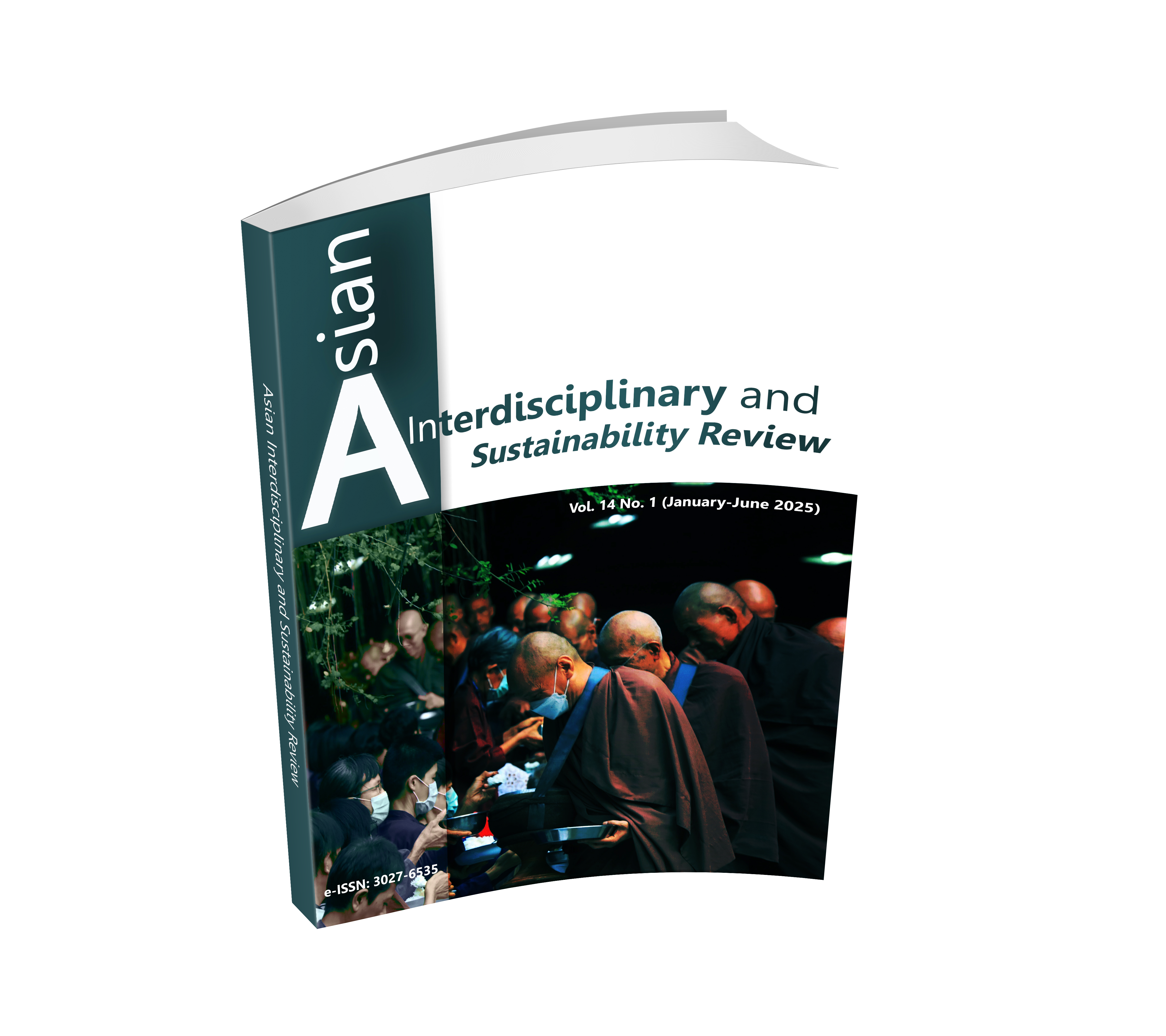ACADEMIC BURNOUT EXPERIENCES OF UNDERGRADUATES SINCE THE COVID-19 PANDEMIC
DOI:
https://doi.org/10.14456/aisr.2025.2Keywords:
Academic Burnout, Phenomenological Study, UndergraduatesAbstract
This qualitative research investigates the academic burnout experiences of undergraduates since the COVID-19 pandemic using a phenomenological qualitative approach. Seven undergraduates were selected based on specific criteria. Data were collected through in-depth interviews. Findings revealed four main themes of their experiences. The first theme is multiple waves of academic burnout. This theme includes fluctuating feelings of powerlessness and recovery, experiencing exhaustion and an inability to continue, a lack of energy to study, a loss of self-control, avoidance of studying, and the sense that life feels ruined. The second theme is characteristics contributing to stress. These include being easily stressed, having high expectations, being inflexible, striving for stability and perfection, and having high expectations for academic performance while being unable to adapt to other areas of life. The third theme is cumulative stress, sleep deprivation, and poor time management. Participants reported experiencing cumulative pressures, stress, inadequate rest, and difficulty managing time or maintaining a coherent schedule. The fourth theme is coping with burnout and seeking support. This theme involves reflecting and building self-confidence, addressing the root causes of problems, and seeking support from friends and family. These results underscore the need for targeted interventions and support mechanisms to address academic burnout and promote student well-being in post-pandemic educational environments.
Downloads
References
Abraham, A., Chaabna, K., Sheikh, J., Mamtani, R., Jithesh, A., Khawaja, S., & Cheema, S. (2024). Burnout increased among university students during the COVID-19 pandemic: A systematic review and meta-analysis. Scientific Reports, 14, 2569.
Alarcon, G., Edwards, J., & Menke, L. (2011). Student burnout and engagement: A test of the conservation of resources theory. The Journal of Psychology, 145(3), 211-227.
Amin, A., Rabiei, M., Amirkhiz, S., & Shomoossi, N. (2024). We are still to learn from our learners: A hidden curriculum developed during the COVID-19 pandemic. Teaching and Teacher Education, 137, 104390.
Andrade, D., Ribeiro, I., Prémusz, V., & Maté, O. (2023). Academic burnout, family functionality, perceived social support, and coping among graduate students during the COVID-19 pandemic. International Journal of Environmental Research and Public Health, 20(6), 4832.
De Hert, S. (2020). Burnout in healthcare workers: Prevalence, impact, and preventative strategies. Local and Regional Anesthesia, 13, 171-183.
Fernández-Castillo, A. (2021). State anxiety and academic burnout regarding university access selective examinations in Spain during and after the COVID-19 lockdown. Frontiers in Psychology, 12, 621863.
Freudenberger, H. (1975). The staff burn-out syndrome in alternative institutions. Psychotherapy: Theory, Research & Practice, 12(1), 73-82.
Gadoh, G. (2019). School identification and school burnout among high school students in faith-based schools in Malaysia. Proceedings International Scholars Conference, 7(1), 1628-1643.
Giorgi, A., Giorgi, B., & Morley, J. (2017). The descriptive phenomenological psychological method. In C. Willig, & W. Stainton-Rogers. (eds.). The SAGE handbook of qualitative research in psychology (pp. 176-192). California: SAGE.
Htay, M., Marzo, R., Bahari, R., AlRifai, A., Kamberi, F., El-Abasiri, R., Nyamache, J., Hlaing, H., Hassanein, M., Moe, S., Abas, A., & Su, T. (2021). How healthcare workers are coping with mental health challenges during COVID-19 pandemic?-A cross-sectional multi-countries study. Clinical Epidemiology and Global Health, 11, 100759.
Irawan, A., Dwisona, D., & Lestari, M. (2020). Psychological impacts of students on online learning during the COVID-19 pandemic. KONSELI: Jurnal Bimbingan dan Konseling, 7(1), 53-60.
Maneewongse, N. (2021). Students Behaviors and Factors Achieving Online Teaching with Line Application during COVID-19. Journal of Educational Studies, 15(1), 161-173.
Marzo, R., Khaled, Y., ElSherif, M., Abdullah, M., Thew, H., Chong, C., Soh, S., Siau, C., Chauhan, S., & Lin, Y. (2022). Burnout, resilience and the quality of life among Malaysian healthcare workers during the COVID-19 pandemic. Frontiers in Public Health, 10, 1021497.
Maslach, C. (2017). Finding solutions to the problem of burnout. Consulting Psychology Journal: Practice and Research, 69(2), 143-152.
Maslach, C., & Jackson, S. (1986). Maslach burnout inventory manual. 2nd ed. California: Consulting Psychologists Press.
Mostafavian, Z., Farajpour, A., Ashkezari, S., & Shaye, Z. (2018). Academic Burnout and Some Related Factors in Medical Students. Journal of Ecophysiology and Occupational Health, 18(1-2), 1-5.
Name and Key Symptoms of Dangerous Communicable Diseases (3rd Edition) 2020.
Rellon, J., Cerna, M., Asuncion, C., Baguio, J., & Kintanar, G. (2024). A path model of psychological well-being of teachers during the Covid-19 pandemic: A positivist and constructivist viewpoint. Asian Journal of Education and Social Studies, 50(5), 127-141.
Schaufeli, W., De Witte, H., & Desart, S. (2019). User manual - Burnout Assessment Tool (BAT) - Version 2.0. Retrieved from https://burnoutassessmenttool.be/wp-content/uploads/2020/08/User-Manual-BAT-version-2.0.pdf.
Schaufeli, W., Martinez, I., Pinto, A., Salanova, M., & Bakker, A. (2002). Burnout and engagement in university students: A cross-national study. Journal of Cross-Cultural Psychology, 33(5), 464-481.
Shahwan, S., Tay, E., Shafie, S., Tan, Y., Gunasekaran, S., Tan, R., Satghare, P., Zhang, Y., Wang, P., Tan, S., & Subramaniam, M. (2024). The protective role of resilience and social support against burnout during the COVID-19 pandemic. Frontiers in Public Health, 12, 1374484.
Suttichainimit, A., & Tuicomepee, A. (2024). Validation of the Thai version of the burnout assessment tool for Thai undergraduates. KKU International Journal of Humanities and Social Sciences, 14(1), 158-174.
Thitichai, P., & Taweewigyakarn, P. (2021). COVID-19 Report. Nonthaburi: Department of Disease Control.
Wang, J., Bu, L., Li, Y., Song, J., & Li, N. (2021). The mediating effect of academic engagement between psychological capital and academic burnout among nursing students during the COVID-19 pandemic: A cross-sectional study. Nurse Education Today, 102, 104938.
Zhu, P., Xu, T., Xu, H., Ji, Q., Wang, W., Qian, M., & Shi, G. (2023). Relationship between anxiety, depression, and learning burnout of nursing undergraduates after the COVID-19 epidemic: The mediating role of academic self-efficacy. International Journal of Environmental Research and Public Health, 20(5), 4194.

Downloads
Published
How to Cite
Issue
Section
License
Copyright (c) 2025 Authors

This work is licensed under a Creative Commons Attribution-NonCommercial-NoDerivatives 4.0 International License.











.png)


